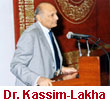Highlights of Dr. Kassim-Lakha's
closing remarks
Following the presentation a panel
moderated by Dr. Shamsh Kassim-Lakha, President, the  Aga Khan University, discussed various issues and questions
raised by the audience. The panel included three members of
the World Bank -UNESCO Task Force, Professor Henry Rosovsky,
Professor David Bloom and Syed Babar Ali (Pro-Chancellor, LUMS);
Dr. Camer W. Vellani (Rector, AKU) Professor Anita Ghulam Ali
(Minister for Education, Sindh) and Capt. U.A. G. Isani (University
Grants Commission).
Aga Khan University, discussed various issues and questions
raised by the audience. The panel included three members of
the World Bank -UNESCO Task Force, Professor Henry Rosovsky,
Professor David Bloom and Syed Babar Ali (Pro-Chancellor, LUMS);
Dr. Camer W. Vellani (Rector, AKU) Professor Anita Ghulam Ali
(Minister for Education, Sindh) and Capt. U.A. G. Isani (University
Grants Commission).
The lively and candid comments, suggestions
and discussion were aptly summarized by President Kassim-Lakha.
He highlighted three critical implications
of the report: (1) There is an urgent need for clear standards
and systems that promote good governance in the Higher Education
sector; (2) Partnerships and alliances are essential both inside
and beyond Pakistan; and (3)The fact that the World Bank and
UNESCO have sponsored this report is a very promising sign for
the health of higher education as is the support of the Governor,
Minister of Education and the Chairman University Grants Commission.
He also drew attention to the need to redress the neglect of
higher education and balance tertiary, primary and secondary
education; the advantage of building on current strengths, the
role of vocational and technical education in the educational
systems in Pakistan; and the need for review of the consequences
of the equity approach to research allocations.
He indicated the need for widening
the resource base for higher education and for the engagement
of the private sector (without neglecting the public sector).
"Donor agencies need to be engaged", he said, "as
resource re-allocation will only address 5-10% of what needs to
be done." He went on to add that "educational programmes
that teach good management are urgently needed. Moral reasoning
and the study of ethics, civilizations and culture are a greater
priority than even the teaching of science and technology.
Change must occur from the grass roots, involving students faculty
and administrators; and the government."
Full Text of the Closing
Remarks